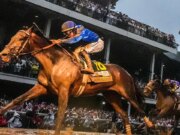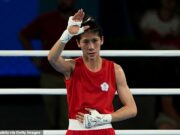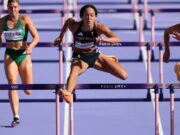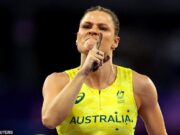This could turn out to be a timely and uplifting narrative for British equestrian sports. In light of the ongoing fallout from a video that surfaced showing Charlotte Dujardin – once the celebrated figure of dressage – whipping a horse 24 times, Team GB might be able to begin mending a significant public relations fiasco.
Following an impressive performance in the cross-country event set against the stunning backdrop of the Château de Versailles, the eventing team is eyeing a promising gold medal opportunity. Laura Collett currently sits in second place in the individual rankings, with just the showjumping event left to compete on Monday. Collett’s journey is particularly inspiring considering that she was placed in an induced coma and suffered multiple fractures after falling from a horse in 2013. A positive narrative to overshadow Dujardin’s downfall would serve both the equestrian community and Team GB favorably. Whether fair or not, winning can often conceal a multitude of sports-related controversies.
Collett, alongside her teammates Tom McEwen and Ros Canter, is undoubtedly aware of the larger context in this scandal-ridden environment. They are also conscious that public sentiment may not favor them on day three. During the penultimate ride of the cross-country, Nicolas Touzaint drove Diabolo Menthe home with a vigor more befitting the Uttoxeter races than the historical grounds of Versailles, ultimately securing second place for France. Team GB currently leads with an 82.50 penalty aggregate, while the hosts trail with 87.20.
“To be leading in the [team standings] is incredible, but we’ll assess everything at the end of the event,” Collett stated. “It’s far from over. While it’s fantastic to be in this position, nothing is certain until the last horse crosses the finish line. The atmosphere was exhilarating.” Collett shared her mixed feelings of nerves and excitement, which had affected her sleep ahead of the cross-country event.
Japan is positioned for a bronze medal, with Switzerland close behind. Germany’s Michael Jung, riding Chipmunk FRH, masterfully navigated the course, finishing seven seconds under the allotted time of 9 minutes and 2 seconds. Based on his performance, Jung – in pursuit of a fourth Olympic gold – will be a formidable contender. Collett’s overall score of 18.30 was narrowly surpassed by Jung’s impressive 17.80.
McEwen, riding the 13-year-old JL Dublin, had previously held the lead but ultimately finished in sixth place. His impeccable ride in 8.58 preserved his dressage score of 25.8. “This is a fantastic Olympic course,” McEwen remarked. “It provides a liberating start and then requires riders to think strategically about when to tighten their approach. I actually adjusted my strategy based on how others were jumping just before my turn.”
Laura Collett jumps into the Menagerie Pond at the Château de Versailles. Photograph: Tom Jenkins/The Guardian
Christopher Burton holds third place for Australia, closely followed by Switzerland’s Felix Vogg. Yoshiaki Oiwa, riding MGH Grafton Street, is in fifth position, creating a long-anticipated link between the Japanese Olympic equestrian team and Dublin’s renowned shopping street.
The obstacles on the course were designed in various quirky shapes, likely an attempt to enhance the visual appeal of the setting. The luxurious surroundings are fitting for a sport that isn’t exactly known for its accessibility to the working class. The large audience was distinctly affluent, predominantly white, and mostly middle-aged or older. While equestrian sports do not shy away from their elitist bubble, incidents like Dujardin’s remind us to consider broader societal implications. Under the sweltering sun, the horses galloped and jumped around a 5.1km course, leaving no room for a voice expressing a desire to opt-out.
after newsletter promotion
Australia’s Kevin McNab withdrew Don Quidam after the horse clipped a fence and appeared to be lame. The Italian rider Emiliano Portale’s horse, Future, was disqualified after blood was discovered in its mouth during a post-dressage examination on Saturday. “Elimination under this rule does not imply any intention to harm or endanger the horse,” stated the FEI, the sport’s governing body. “However, the FEI enforces these rules to ensure that horse welfare is always prioritized.” This is certainly not the time for taking risks.
Collett described London 52 as “the horse of a lifetime.” Remarkably, the horse lost a shoe early on during the cross-country course. Collett noted, “He’s not inherently a cross-country horse, yet he navigated that course as if he were on railway tracks. He was flawless. This proves what a strong partnership can be built and how much you can instill confidence in them. I have complete faith in him now, allowing me to enjoy the experience.” The stakes are incredibly high; for Collett, McEwen, Canter, and the sport they endeavor to revitalize.



































